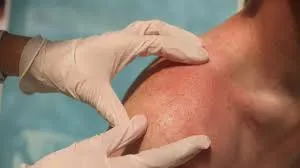How Dermatologists Diagnose and Treat Common Skin Conditions

Regular consultations with a dermatologist provide insights into various skin conditions, their underlying causes, and evidence-based treatment options. Dermatologists are integral in diagnosing, managing, and improving skin health, addressing both medical and aesthetic concerns. Here’s some information on the dermatology methods used to identify skin conditions and the treatments prescribed for common issues.
Diagnostic Process
Diagnosing skin conditions involves a thorough evaluation combining patient history, visual inspection, and specialized diagnostic tools. Dermatology gives a structured approach to accurately identify and manage conditions effectively. The basis of any dermatological evaluation begins with a detailed assessment of the patient’s medical history. Questions are asked about symptoms, prior illnesses, familial conditions, lifestyle factors, and potential irritants such as specific skincare products, diet, or environmental exposure. This information helps dermatologists form a foundational understanding of the patient’s unique skin health profile and possible triggers for their condition.
Visual Examination
Through specific training, dermatologists develop expertise in identifying visual characteristics of various skin issues. A comprehensive skin examination reveals condition factors such as discoloration, rashes, lesions, or unusual textures. These observations provide key clues for the diagnostic process.
Diagnostic Tests
When visual and historical data do not provide definitive conclusions, additional tests are conducted. Common diagnostics include skin biopsies, which involve analyzing a tissue sample under a microscope. Patch testing may be utilized to detect allergic reactions, while a dermatoscope aids in magnified evaluation of moles and lesions.
Other laboratory tests may confirm bacterial, viral, or fungal infections affecting the skin. Certain chronic conditions, such as eczema and psoriasis, necessitate continuous observation. Dermatologists monitor changes in skin health over time, adapt treatment plans based on progress, and evaluate responses to prescribed therapies.
Treatment Approaches
Treatment of skin conditions incorporates a wide range of methods targeted to each individual’s needs. Dermatologists focus on alleviating immediate symptoms while supporting long-term skin health. Some ways they do this include:
- Topical Treatments: Topical formulations form the first line of defense for many conditions, including acne, eczema, and psoriasis. These medications include creams, gels, and ointments containing active ingredients such as retinoids, corticosteroids, and antimicrobials. By reducing inflammation, combating infection, or enhancing cell turnover, topical treatments address the specific pathology underlying the condition.
- Oral Medications: For moderate to severe conditions, oral medications provide targeted and systemic relief. Antibiotics may be prescribed to treat bacterial infections, while antihistamines are often used for chronic hives or allergies. Systemic treatments are prescribed carefully and regularly monitored due to potential side effects.
- Non-Invasive Procedures: Non-invasive treatments, including chemical peels, laser therapy, and light therapy, serve as additional options for managing hyperpigmentation, rosacea, and other conditions. These procedures are executed in clinical settings and tailored to the patient’s skin type and response to prior treatments.
Personalized Care Through Dermatology
Regular check-ups with a dermatologist helps to give appropriate diagnostic methods and treatment options to address specific concerns. For patients seeking solutions to ongoing issues, a dermatologist provides professional expertise and tailored strategies to maintain optimal skin health. Connect with a licensed dermatologist to explore personalized treatment plans designed for your specific needs.





